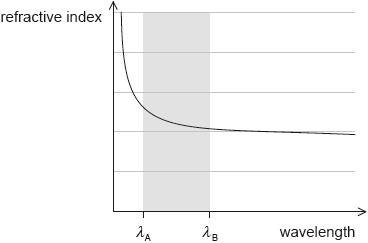| Date | May 2018 | Marks available | 2 | Reference code | 18M.3.SL.TZ2.10 |
| Level | Standard level | Paper | Paper 3 | Time zone | Time zone 2 |
| Command term | Calculate | Question number | 10 | Adapted from | N/A |
Question
An optic fibre of length 185 km has an attenuation of 0.200 dB km–1. The input power to the cable is 400.0 μW. The output power from the cable must not fall below 2.0 μW.
An optic fibre of refractive index 1.4475 is surrounded by air. The critical angle for the core – air boundary interface is 44°. Suggest, with a calculation, why the use of cladding with refractive index 1.4444 improves the performance of the optic fibre.
Calculate the maximum attenuation allowed for the signal.
An amplifier can increase the power of the signal by 12 dB. Determine the minimum number of amplifiers required.
The graph shows the variation with wavelength of the refractive index of the glass from which the optic fibre is made.

Two light rays enter the fibre at the same instant along the axes. Ray A has a wavelength of λA and ray B has a wavelength of λB. Discuss the effect that the difference in wavelength has on the rays as they pass along the fibre.
In many places clad optic fibres are replacing copper cables. State one example of how fibre optic technology has impacted society.
Markscheme
sin c = \(\frac{{1.4444}}{{1.4475}}\) or sin c = 0.9978
critical angle = 86.2«°»
with cladding only rays travelling nearly parallel to fibre axis are transmitted
OR
pulse broadening/dispersion will be reduced
OWTTE
[3 marks]
attenuation = «10 log\(\frac{I}{{{I_0}}}\)» = 10 log\(\frac{{2.0 \times {{10}^{ - 6}}}}{{400 \times {{10}^{ - 6}}}}\)
attenuation = «–»23 «dB»
Accept 10 log\(\frac{{400}}{{2.0}}\) for first marking point
[2 marks]
185 × 0.200 = 37 loss over length of cable
«\(\frac{{37 - 23}}{{12}}\) = 1.17» so two amplifiers are sufficient
[2 marks]
mention of material dispersion
mention that rays become separated in time
OR
mention that ray A travels slower/arrives later than ray B
[2 marks]
high bandwidth/data transfer rates
low distortion/Low noise/Faithful reproduction
high security
fast «fibre» broadband/internet
high quality optical audio
medical endoscopy
Allow any other verifiable sensible advantage
[1 mark]

